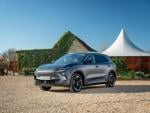Ford will continue to build its bioethanol Flexi-Fuel Focus alongside its new range of ECOnetic models, but has called on the Government to give the dual-fuel cars more support.
Speaking at the Geneva Motor Show, Ford of Britain chairman and managing director Roelant de Waard confirmed that the car had a future.
He said: “We will continue to build Flexi-Fuel Focus but we need the right conditions in the UK to create demand and if the support from the Government is not larger then buying one is something many are not prepared to do.
“It can work – we have success with Flexi-Fuel in Sweden, France and Spain, selling a number of cars because there is active backing from the governments in those countries.
“Buyers need to understand what the CO2 benefit of bioethanol is, too.
"I think there’s a general belief that biofuels are here to stay, but it is easiest to get into the UK network through blending biofuel into petrol and diesel in small amounts, increasing it gradually over the years.”
Ford’s 1.8-litre Focus and C-MAX Flexi-Fuel Vehicles (FFVs) run on a blend of 85% bioethanol produced from home-grown wheat and 15% petrol, but little support for purchasing the vehicles and near-non-existent availability on the forecourts makes it difficult for fleets to consider in all but a limited role.
Over the next year, Ford’s attention will switch to low-CO2 models in its standard car range under the diesel brand ECOnetic, starting with the new Focus ECO-netic, with deliveries starting around now.
Mr de Waard said demand had been “well beyond expectations” for it, but that there was sufficient capacity to satisfy all orders.
Mr de Waard confirmed there would be low-emission ECOnetic versions of the Mondeo and new Fiesta (pictured below) too, with the latter offering less than 100g/km of CO2.
















Login to comment
Comments
No comments have been made yet.